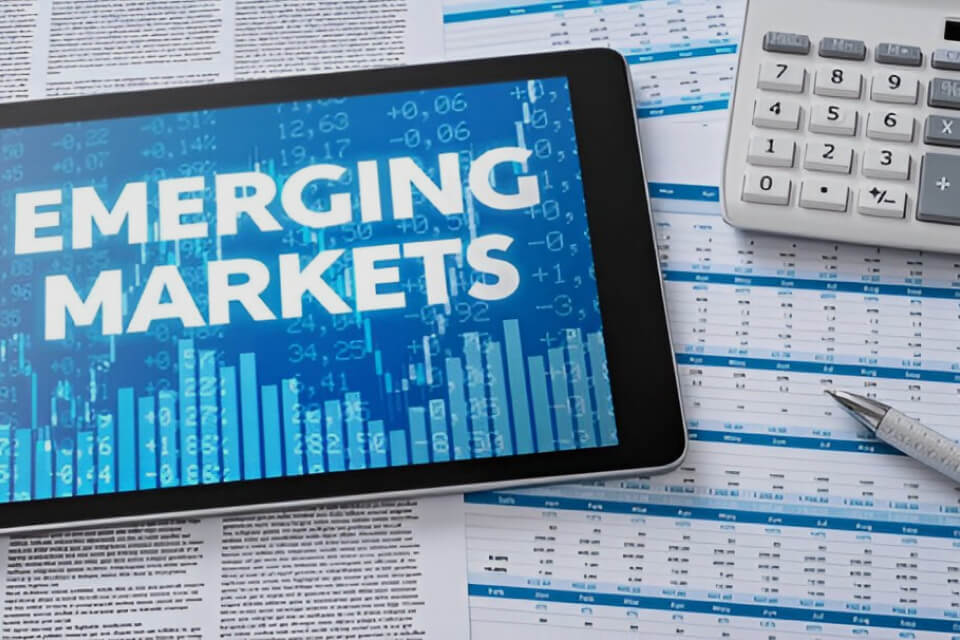- Introduction
- Introduction to Emerging Markets
- Potential Benefits of Investing in Emerging Markets
- Challenges and Risks of Investing in Emerging Markets
- Economic and Geopolitical Factors Influencing Emerging Markets
- Evaluating Country-specific Risks
- Mitigating Risks and Enhancing Risk-adjusted Returns
- Long-term Perspective and Outlook
- Frequently Asked Questions
- Conclusion
Introduction
Understanding emerging market dynamics is crucial for any astute investor in the fast-paced stock investing world. This article aims to provide a detailed exploration of the benefits and risks of investing in emerging markets. By the end of this guide, you’ll gain valuable insights into navigating the complex landscape of global investments.
Introduction to Emerging Markets
Definition and Characteristics
Emerging markets, also known as developing economies, are countries that are growing quickly and changing fast. These countries are seeing more factories, bigger cities, stronger financial systems, and higher GDP growth rates. Because of this, they offer both exciting chances and real challenges for investors.
At the same time, there are emerging trends, which are new ideas, behaviors, or changes that are starting to get noticed in a certain industry, field, or society. For example, these trends can change how people work, shop, or even think. Over time, they can shake things up and lead to big shifts in how things are done.
That’s why, spotting and understanding these trends early is so important. Whether you’re a person, a business, or part of an industry, staying on top of these trends helps you stay creative, ready, and ahead of the game. In the end, knowing what’s coming next is the key to staying successful in a fast-changing world.

Historical Perspective
Taking a quick look at the history of emerging markets is like following the path of economic growth. In the beginning, these countries were mostly focused on farming, had poor infrastructure, and depended on old-fashioned industries. But over time, something amazing started to happen—they began to change and grow.
Step by step, these markets moved from being small and developing to becoming strong players in the global economy. And because of that, investors can learn a lot by studying how far they’ve come. By looking back, you can understand the struggles these markets faced and how they overcame them.
Not only that, but history also shows what helped them grow—like better technology, more trade, and smarter investing. In the end, knowing the past helps investors make smarter choices about the future. So, understanding this journey is key to seeing where emerging markets are headed next.
Significance in the Global Economy
Emerging markets are not just small or local players—they are big influencers in the global economy. In fact, their actions affect countries all over the world. From shaping trade to drawing in investors and pushing new technology, their impact reaches far and wide.
That’s why it’s so important for investors to understand how emerging markets fit into the bigger picture. They aren’t working alone—they are deeply connected to the rest of the world. So, when these markets grow, they help the global economy grow too.
Also, they play a big role in international trade and are becoming key places for innovation and tech progress. In other words, they help drive change and create new opportunities. Because of this, keeping an eye on emerging markets is a smart move for anyone looking to understand and succeed in today’s fast-changing economy.
Potential Benefits of Investing in Emerging Markets
Economic Growth Opportunities
1. Market Expansion
Investing in emerging markets is like stepping into a world full of new chances. Why? Because these markets are wide open, full of space for businesses to grow and succeed. In many ways, it’s like starting with a blank canvas, ready to be filled with fresh ideas, new products, and bold moves.
2. Increased Consumer Demand
As more people in these countries move into the middle class, they start spending more. And because of that, there’s a big demand for all kinds of goods and services. So, this shift is exciting for both businesses and investors. It means more customers, more sales, and more ways to meet different needs.
Diversification Benefits
1. Portfolio Expansion
Diversifying your investment portfolio by adding emerging markets to your investment mix is a smart move. Just like planting seeds in different kinds of soil, this strategy helps your money grow in more places. In turn, it gives you more ways to earn and keeps your portfolio strong.
2. Risk Spreading
Spreading your investments across different assets in emerging markets is a smart way to handle risk. That’s because it protects you from putting all your eggs in one basket. So, if one part struggles, the rest can still grow. In the end, this approach helps you stay steady, even when markets get a little bumpy.
Challenges and Risks of Investing in Emerging Markets
Political Risks
1. Government Stability
Political stability is super important for long-term growth in emerging markets. When the government is strong and steady, it helps businesses feel safe and confident. However, if there’s political trouble or leadership changes often, it can create big problems for investors. That’s why, checking the political scene before investing is always a smart move.
2. Regulatory Environment
At the same time, understanding the rules and laws in a country is just as important. Every country has its own way of doing things, and those rules can affect how businesses work. So, staying updated on any changes helps investors avoid surprise problems. After all, knowing the rules makes it easier to plan ahead.
Economic Risks
1. Currency Fluctuations
In emerging markets, the value of money can change fast. And when that happens, it can affect how much profit investors make. So, it’s important to learn how to protect your money from big swings in currency. By using smart strategies, investors can reduce the risk and stay on track.
2. Inflation and Deflation
Inflation means prices go up fast, and deflation means prices fall too quickly. Either way, both can make things tricky for investors. That’s why, understanding the country’s economy is key. By planning ahead and using the right tools, investors can protect their investments from these ups and downs.
Social and Cultural Risks
1. Social Unrest
Now and then, protests or conflicts can shake things up in emerging markets. When that happens, the market can become unstable. So, it’s really important for investors to keep an eye on social changes and possible unrest. By staying informed, they can be ready to react fast if things go sideways.
2. Cultural Differences
Different countries have different ways of doing business. And because of that, understanding local traditions and behaviors is a big deal. For example, what works in one country might not work in another. So, being open-minded and learning about local cultures helps investors build better relationships and make smarter choices.
Economic and Geopolitical Factors Influencing Emerging Markets
Global Economic Trends
Understanding how emerging markets connect with global trends is super important. Why? Because the global economy affects everything—from prices to profits. So, when the world economy grows or slows down, it usually has a big impact on emerging markets. That’s why, keeping an eye on these big-picture trends helps investors spot both new chances and possible risks. In the end, knowing what’s happening globally makes it easier to plan smart moves.
Geopolitical Influences
Geopolitical events —like conflicts, elections, or trade tensions—can really shake up emerging markets. Sometimes, these events can powerfully shape market sentiments and influence investment outcomes. Other times, they open the door to new growth. That’s why, staying updated on world news is key. By doing so, investors can act quickly and wisely when things change. After all, a good understanding of what’s going on globally helps you stay one step ahead.
Trade Relationships and Policies
Trade plays a huge role in shaping the future of emerging markets. So, knowing who trades with who—and under what rules—really matters. For example, when trade policies shift or new deals are made, it can create new business opportunities or challenges. That’s why, investors should always pay close attention to trade agreements, tariffs, and partnerships. In the end, being tuned in to these changes helps you make smart, timely decisions that fit the global market’s flow.
Evaluating Country-specific Risks
Understanding the risks associated with specific countries in emerging markets is crucial for successful investments. Let’s explore how to analyze these risks and translate them into actionable investment strategies.
Country-specific Analysis
1. Comparative Risk Assessment
Comparing risks between different countries is one of the smartest ways to manage investments in emerging markets. Why? Because not every country has the same risks. Some may offer big opportunities, while others may come with more challenges. So, by looking closely at each country’s risk level, investors can decide where it’s smart to invest more and where to be extra careful. In the end, this helps investors put their money where it has the best chance to grow—while avoiding surprises.
2. Investment Implications
Once you understand the risks, the next step is knowing what to do with that information. This is where smart investors stand out. They take what they’ve learned and use it to build strong investment plans. That means adjusting their portfolios to match each country’s risk level. For example, they might invest more in stable markets and go slow in riskier ones. So, learning how to turn risk insights into real strategies is key to winning in the world of emerging markets.

Mitigating Risks and Enhancing Risk-adjusted Returns
Risk Mitigation Strategies
1. Due Diligence
Doing your homework—also called due diligence—is one of the most important steps when investing in emerging markets. Why is that? Because these markets can be full of surprises. So, it’s key to look closely at the country’s economy, politics, and social issues before jumping in. That way, investors can spot possible problems early and avoid costly mistakes. In short, careful research gives you a clear picture of what you’re getting into.
2. Adaptive Investment Strategies
Things change fast in emerging markets, and that means investors need to be flexible. So, having an investment strategy that can change with the market is a big advantage. For example, if the economy shifts or a new law is passed, investors should be ready to tweak their plans. After all, being able to adjust quickly helps protect your money and keeps your investments strong. In the end, the most successful investors are the ones who can go with the flow—while still staying one step ahead.
Enhancing Returns through Strategic Planning
1. Long-term Investment Strategies
Thinking long term is one of the best ways to grow your money in emerging markets. Why? Because these markets may take time to fully develop, but they often show strong growth over the years. So, if investors focus on steady, long-term opportunities, they can ride the wave of growth. In other words, being patient and planning for the future can lead to big rewards. That’s why building a long-term plan that matches the growth path of these markets is a smart move.
2. Tactical Portfolio Adjustments
At the same time, being flexible with your investments is just as important. Markets go up and down, and things can change quickly—especially in emerging markets. So, smart investors regularly check and adjust their portfolios. By doing this, they make sure their money is working in the best way possible. For example, shifting money between stocks, bonds, or other assets helps balance risk and return. That’s why, learning how to fine-tune your investment mix can lead to stronger, more stable growth over time.
Long-term Perspective and Outlook
Taking a long-term view of emerging markets means looking beyond short-term ups and downs. Instead, it’s about spotting strong growth chances that last. So, rather than reacting to every market move, investors should focus on what truly matters for the future. That’s why, thinking long-term helps investors stay ready, make smarter choices, and grow their money over time.
Sustainable Growth Opportunities
Finding long-lasting growth opportunities is the key to doing well in emerging markets. So, investors should look for industries and sectors that are built to grow and stick around. For example, clean energy, technology, and healthcare are areas that could grow for years. That’s why, putting money into these strong sectors helps build a portfolio that can stand the test of time. In the end, it’s not just about fast profits—it’s about steady success.
Future Trends in Emerging Markets
At the same time, watching future trends is just as important. Emerging markets change fast, so it’s smart to stay ahead of what’s coming. That’s why, investors should always be looking forward and adjusting their plans when needed. For example, shifts in technology, population growth, or global trade can all affect how these markets grow. So, staying alert and ready to adapt helps investors face the future with confidence.

Frequently Asked Questions
1. Are specific industries within emerging markets offering higher growth potential?
Yes, industries like technology, renewable energy, and healthcare often show promising growth in emerging markets due to increasing consumer demand and technological advancements.
2. How can investors effectively navigate the social and cultural risks mentioned in the article?
Building strong local partnerships, conducting cultural sensitivity training, and staying abreast of social dynamics through local networks are effective strategies for navigating social and cultural risks.
3. How can investors hedge against currency fluctuations in emerging markets?
Investors can use financial instruments like currency futures and options, diversify currency exposure, and stay informed about macroeconomic factors affecting currency movements to mitigate risks associated with currency fluctuations.
4. How does political stability impact long-term investments in emerging markets?
Political stability is crucial for sustained economic growth. Investors should assess the historical political stability of a country, stay updated on current political events, and consider the impact on long-term investment horizons.
5. What tactical adjustments can investors make to enhance risk-adjusted returns in their portfolio?
Regularly rebalancing the portfolio, incorporating dynamic asset allocation strategies, and leveraging risk management tools are tactical adjustments that can enhance risk-adjusted returns in emerging markets.
Conclusion
In summary, successfully navigating emerging markets means taking a clear and complete approach. First, it requires understanding their history and how they have grown over time. Next, it’s important to know why these markets matter in the global economy. Then, investors must weigh the good opportunities along with the possible risks. Also, looking at risks in each country through examples helps make smart choices for your investments. Moreover, managing risks calls for careful research, flexible strategies, and adjusting your plans when needed. Finally, having a long-term view focuses on finding steady growth, keeping up with new trends, and using practical tips for lasting success. Altogether, this guide gives investors a strong and balanced plan to do well in the changing world of emerging markets.



